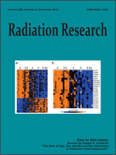
RADIATION RESEARCH
Scope & Guideline
Innovative studies shaping the future of radiation science.
Introduction
Aims and Scopes
- Radiation Biology and Medical Applications:
Research that investigates the biological effects of radiation on living organisms, including mechanisms of radiation-induced damage and the development of therapeutic strategies to mitigate these effects. - Radiotherapy Techniques and Innovations:
Studies focusing on advancements in radiotherapy methods, including intensity-modulated radiation therapy (IMRT), stereotactic body radiotherapy (SBRT), and novel dosimetric techniques to enhance treatment efficacy and reduce side effects. - Diagnostic Imaging and Assessment:
Research exploring various imaging modalities such as CT, MRI, and PET/CT for diagnosing cancer and other diseases, including studies on imaging biomarkers for prognosis. - Radiation Safety and Dosimetry:
Investigations into radiation exposure levels, safety protocols, and dosimetric assessments to protect patients and healthcare workers from harmful radiation effects. - Environmental Radiation and Health Risks:
Studies assessing natural and artificial radiation levels in the environment, their biological impacts, and the associated health risks for populations exposed to varying radiation doses.
Trending and Emerging
- Integrative Approaches in Radiotherapy:
There is a growing trend towards integrating radiotherapy with other treatment modalities, such as immunotherapy and targeted therapies, highlighting the need for multidisciplinary approaches to cancer treatment. - Artificial Intelligence and Machine Learning in Imaging:
The application of AI and machine learning techniques in diagnostic imaging and radiotherapy planning is becoming increasingly prevalent, indicating a significant shift towards data-driven methodologies in radiation research. - Radioprotective Agents and Strategies:
Research into pharmacological agents and natural compounds that can protect against radiation damage is on the rise, reflecting an increased interest in mitigating the side effects of radiation therapies. - Personalized Medicine in Radiation Oncology:
Emerging studies focus on tailoring radiotherapy based on genetic and molecular profiling of tumors, indicating a shift towards more personalized treatment approaches in oncology. - Impact of Environmental Radiation on Health:
Research examining the health effects of environmental radiation exposure, particularly in specific populations, is gaining attention, reflecting broader concerns about public health and safety.
Declining or Waning
- Traditional Radiobiology Studies:
Research focusing on classical radiobiological mechanisms and effects is declining, possibly due to the emergence of more complex studies involving molecular and genetic factors affecting radiation responses. - Non-Medical Applications of Radiation:
Papers on the use of radiation in non-medical fields (such as industrial applications) appear to be less prevalent, indicating a shifting focus towards more clinically relevant applications. - Basic Dosimetry Techniques:
Studies that focus solely on basic dosimetric calculations without integrating advanced technology or innovative methodologies have decreased, as there is a growing emphasis on more sophisticated and clinically applicable dosimetric models.
Similar Journals
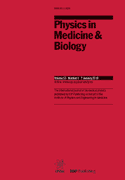
PHYSICS IN MEDICINE AND BIOLOGY
Transforming Diagnostics and Therapies with PhysicsPHYSICS IN MEDICINE AND BIOLOGY is a prestigious journal published by IOP Publishing Ltd, with a storied history dating back to 1956 and extending through 2024. This internationally recognized journal caters to the interdisciplinary fields of medical physics and bioengineering, making significant contributions to the research and development of advanced diagnostic and therapeutic technologies. It holds an impressive Q1 ranking in both Radiological and Ultrasound Technology and Radiology, Nuclear Medicine and Imaging categories, reflecting its critical role in disseminating high-quality research. With a significant focus on merging the principles of physics with advancements in medicine, PHYSICS IN MEDICINE AND BIOLOGY serves as an essential resource for researchers, professionals, and students alike, fostering innovation and enhancing collaboration in the healthcare sector. Although the journal is not currently open access, it maintains robust participation in the Scopus database, ranking #62 out of 333 in Radiology, Nuclear Medicine and Imaging and #17 out of 63 in Radiological and Ultrasound Technology, signifying its influence and reach within these disciplines.

Journal of Radiation Protection and Research
Advancing Knowledge for a Safer TomorrowJournal of Radiation Protection and Research, published by the Korean Association of Radiation Protection (KARP), serves as a pivotal platform for disseminating innovative research in the fields of radiation safety and health-related issues. With an ISSN of 2508-1888 and an E-ISSN of 2466-2461, this South Korea-based journal aims to bridge the gap between scientific research and practical application, emphasizing radiation protection, environmental health, and public safety. Though categorized in Q4 for Health, Toxicology and Mutagenesis, and Q3 for several other scopes as of 2023, the journal is dedicated to publishing high-quality studies that contribute to the improvement of safety standards and methodologies in radiation practice. The journal also provides valuable insights for practitioners in the healthcare and environmental sectors, making it an essential resource for researchers, professionals, and students alike who aspire to advance their understanding and application of radiation science. As the field evolves, so does the Journal of Radiation Protection and Research, which seeks to foster a collaborative and innovative academic community dedicated to ensuring safe and effective radiation use.

Japanese Journal of Radiology
Elevating Radiology Research to New HeightsThe Japanese Journal of Radiology, published by SPRINGER, serves as a premier platform for disseminating cutting-edge research and clinical advancements in the fields of radiology, nuclear medicine, and imaging. With an ISSN of 1867-1071 and E-ISSN 1867-108X, this journal has established itself as a vital resource for practitioners, researchers, and students alike. Renowned for its high-quality peer-reviewed articles, it currently enjoys a respectable impact factor within the Q2 category of Scopus rankings, placing it in the 69th percentile among 333 journals in its field. The journal has seen consistent convergence of research from 2009 to 2024, further underscoring its commitment to advancing the understanding of radiological practices. Importantly, the journal offers Open Access options to facilitate widespread dissemination of knowledge, ensuring that vital research reaches its audience without barriers. Addressed in Japan, the Japanese Journal of Radiology plays a critical role in enhancing the global discourse on medical imaging, making it an essential resource for anyone engaged in this dynamic field.
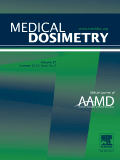
Medical Dosimetry
Pioneering Research in Medical Radiation ApplicationsMedical Dosimetry is a distinguished journal published by Elsevier Science Inc, dedicated to the advancing field of medical dosimetry and its applications within oncology, radiology, and nuclear medicine. With its ISSN 0958-3947 and E-ISSN 1873-4022, this journal serves as a crucial resource for researchers and professionals aiming to enhance their understanding of radiation treatment planning and dosage calculations. Encompassing a comprehensive range of topics from clinical dosimetry to technology assessment, Medical Dosimetry has been disseminating significant findings since its establishment in 1988, contributing to the continuous development of best practices in patient care and safety. The journal currently holds a Q3 ranking in various categories, reflecting its pivotal role in the research community, while not currently offering open access, it remains an essential reference for scholars advancing the techniques utilized in medical imaging and treatment. By fostering a platform for high-quality research, it aims to bridge the gap between theoretical studies and clinical applications, making it a vital addition to any medical library.

International Journal of Radiation Research
Empowering Discoveries in Radiation TechnologyThe International Journal of Radiation Research, published by the IJRR-IRANIAN JOURNAL RADIATION RES, serves as a critical platform for researchers and professionals in the fields of radiology, nuclear medicine, and imaging technology. Since its inception in 2003, this peer-reviewed, open-access journal has focused on disseminating significant findings and advancements, contributing to the global discourse on radiation research. With an ISSN of 2322-3243, the journal offers valuable insights into emerging technologies and methodologies, maintaining a commitment to enhancing the understanding and application of radiation in medical science. Although currently positioned in the Q4 category across its scopes, the journal strives to elevate its impact by promoting high-quality research and innovative practices. The journal is accessible to a wide audience and encourages submissions from scholars worldwide, directly supporting the advancement of knowledge in radiological and ultrasound technology. For those seeking to explore and contribute to this dynamic field, the International Journal of Radiation Research represents an invaluable resource.
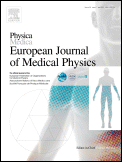
Physica Medica-European Journal of Medical Physics
Transforming Medical Physics Through Collaborative ResearchPhysica Medica - European Journal of Medical Physics is a premier peer-reviewed journal published by ELSEVIER SCI LTD, dedicated to advancing the field of medical physics. Established in 1989 and serving as a critical platform for innovative research, this journal covers a broad spectrum of topics within biophysics, radiology, and imaging sciences, consistently ranked in the Q1 category across these disciplines. With an impressive impact factor that highlights its influence within the scientific community—ranking 52/333 in Radiology, 42/243 in Physics and Astronomy, and 35/152 in Biochemistry—the journal is a valuable resource for professionals, researchers, and students aiming to contribute to the technological and methodological advancements in medical physics. Physica Medica is committed to fostering open dialogue and collaboration within the global medical physics community, although it currently does not offer open access options. The journal's extensive citation history and ongoing relevance underscore its importance in the continuous evolution of medical science.

Nuclear Physics and Atomic Energy
Illuminating the path of atomic advancement.Nuclear Physics and Atomic Energy is a reputable open-access journal that focuses on the fields of nuclear physics and high-energy physics, providing a forum for researchers, professionals, and students to share their findings and advancements. Published by the Institute of Nuclear Research, National Academy of Sciences of Ukraine, this journal has been committed to disseminating knowledge since its inception in 2006, ensuring that scientific advancements remain accessible to a global audience. With an ISSN of 1818-331X and an E-ISSN of 2074-0565, the journal features a diverse array of articles that span the continued exploration and application of nuclear phenomena. Although currently categorized in the Q4 quartile for Nuclear and High Energy Physics in 2023, the journal is steadily working towards increasing its impact and engagement within the academic community. With a Scopus rank of #74 out of 87 in its category, it serves as a valuable resource for advancing crucial research in a vital scientific area. Researchers are encouraged to contribute their innovative studies to foster collaboration and knowledge sharing in this dynamic field.
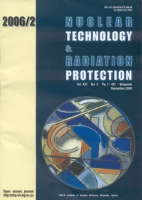
Nuclear Technology & Radiation Protection
Elevating standards in radiation protection and technology.Nuclear Technology & Radiation Protection is a distinguished open-access journal published by the VINCA Institute of Nuclear Sciences, Serbia, dedicated to advancing knowledge in the fields of nuclear energy and radiation safety. Since its inception in 2002, the journal has been an essential resource for researchers, professionals, and students, offering a platform for the dissemination of high-quality research that contributes to the safe and efficient use of nuclear technology. With an impressive Q2 ranking in both the Nuclear Energy and Engineering and Safety, Risk, Reliability and Quality categories for 2023, the journal reflects a commitment to excellence and relevance within its scope. It serves as a pivotal forum for sharing innovative findings, addressing current challenges, and contributing to the global discourse on nuclear safety and technology. The journal is indexed in Scopus, enhancing its visibility and impact in the academic community. By facilitating unrestricted access to its articles, Nuclear Technology & Radiation Protection continues to foster collaboration and engagement among scholars in the nuclear science domain.
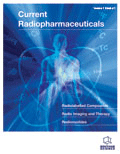
Current Radiopharmaceuticals
Illuminating the future of nuclear medicine and imaging.Current Radiopharmaceuticals, published by Bentham Science Publishers Ltd, is an esteemed journal dedicated to advancing the field of radiopharmaceuticals. With an ISSN of 1874-4710 and an E-ISSN of 1874-4729, this journal has been a significant platform for researchers since its inception in 2009, and will continue to contribute to the literature until at least 2024. Current Radiopharmaceuticals is recognized for its impactful contributions, holding a record of Q3 in Pharmacology and Q2 in Radiology, Nuclear Medicine, and Imaging as of 2023, illustrating its vital role in these domains. The journal aims to provide a comprehensive overview of the latest techniques, applications, and innovations within the field of radiopharmaceutical science, catering to a diverse audience of researchers, professionals, and students. Despite its significant contributions, the journal remains committed to enriching the academic community with high-quality, peer-reviewed articles that can be accessed worldwide, reflecting a dedication to open dialogue and knowledge dissemination in radiopharmaceutical research.
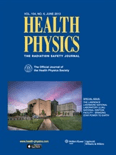
HEALTH PHYSICS
Elevating Standards in Health Physics ResearchHEALTH PHYSICS is a leading academic journal dedicated to the study and dissemination of knowledge in the fields of radiology, epidemiology, and health toxicology. Published by Lippincott Williams & Wilkins, this esteemed journal has been a cornerstone of research since its inception in 1958, and it continues to foster important discussions and advancements in the discipline. With a notable impact factor and consistently ranking in the Q2 and Q3 quartiles across various categories in 2023, HEALTH PHYSICS serves as a vital resource for scholars, practitioners, and students seeking the latest insights and methodologies in the management of radiation exposure and its health implications. While the journal does not offer open access, it remains a critical platform for peer-reviewed articles that contribute to public health and environmental safety. The journal's comprehensive scope and historical significance underscore its importance in advancing knowledge and practices within its field, making it an essential read for anyone engaged in the multidisciplinary realms of health physics.